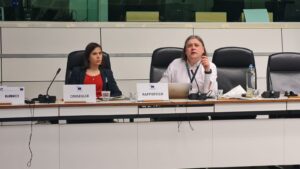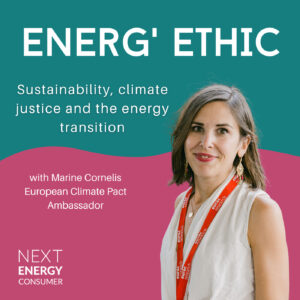We have been witnessing significant strides towards inclusivity in international development and sustainable energy, as many Energ’Ethic podcast guests can confirm. As we approach International Women’s Day, I’m thrilled to share our latest episode of Energ’Ethic featuring the incredible Silvia Sartori. Silvia has pioneered integrating gender-inclusive approaches (gender mainstreaming) in her ventures across Asia and Sub-Saharan Africa.
Embracing Gender Mainstreaming in Sustainable Energy
Sartori’s fascination with Asia, rooted in her academic pursuits, has guided the first steps of her career. However, her first engagements in sustainable energy and development in the Asian landscape underscored a glaring disparity: the underrepresentation of women in environmental sustainability discussions and the lack of gender inclusivity. This sparked her quest to unearth the reasons behind this gap and champion gender representation.
Impact of Gender Inclusivity in Sustainability Projects
Through rigorous research conducted from 2013 to 2017, Sartori uncovered a pivotal truth: gender inclusivity is lagging among project leaders despite all forms of diversity being critical to building more resilient solutions. She observed how projects that actively engaged women, like sustainable consumption initiatives, yielded more favorable outcomes. For instance, women’s central role in transitioning to eco-friendly alternatives like reusable bags was not just as primary consumers but also as influential community advocates, reshaping consumption behaviors.
Beyond Tokenism: Integrating Gender in Project Design and Implementation
While significant progress has been made in recognizing gender in development initiatives, translating this into tangible impact remains challenging. Sartori delivers step-by-step tips on gender inclusivity. She reflects on her experiences with the complexity of navigating cultural sensitivities and societal openness toward gender equality in various regions.
Sartori now advocates to start with a holistic gender assessment at the outset of projects. This approach goes beyond mere tokenistic involvement or gender quotas. It involves deep diving into existing gender relations and structures, identifying disparities and opportunities, and tailoring the next steps of interventions to address these challenges.
In line with Sustainable Development Goal 7, Sartori emphasizes the importance of considering gender roles and local customs in energy interventions. Her focus on initiatives like clean cookstoves illustrates the need for direct involvement of women, who are often household energy managers, to ensure cultural compatibility and effectiveness.
The Essence of GESI: Gender Equality and Social Inclusion
Sartori’s work embraces ‘GESI’ – Gender Equality and Social Inclusion. This concept extends beyond gender, aiming to amplify the voices and address the needs of diverse and marginalized groups like persons with disabilities, ethnic and religious minorities, refugees, and the unemployed. It represents an intersectional approach where diversity in its many forms is actively integrated into projects.
Empowering Women in the Energy Sector
Addressing the gender gap in the energy sector, Sartori underscores the need for diversifying the workforce and encouraging women’s participation in STEM fields. Initiatives like mentorship programs and internships for young women in energy and cultural efforts to challenge stereotypes are crucial for promoting gender diversity in technical and managerial roles.
Conclusion
Sartori’s journey and insights offer a blueprint for integrating gender perspectives in sustainable energy and development. Her advocacy for gender-sensitive approaches reflects a commitment to bridging gaps and achieving a more equitable energy future. As we continue to work on turning these principles into action, this podcast episode is a masterclass on gender mainstreaming, useful for anyone willing to build a more inclusive and sustainable world.





